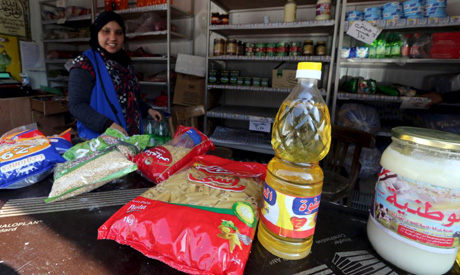
File Photo: A worker sells subsidized food commodities at a government-run supermarket in Cairo, Egypt, Feb.14, 2016 (Photo: Reuters)
Egypt’s annual urban consumer price inflation dropped to 21.9 percent in December, from 26 percent the previous month, the country’s official statistics agency CAPMAS announced on Wednesday.
In an official statement, CAPMAS said the drop in the rate of urban monthly consumer price inflation in December (0.2%) was a first since November 2015.
Shortly following the CAPMAS announcement, Egypt’s Finance Minister Amr El-Garhy said in an official press statement that he expects the rate of inflation to drop below 20 percent next month and recede down to 10-12 percent by the end of 2018.
Egypt has been pushing ahead with a series of economic reform measures, including fuel and electricity subsidy cuts, to help ease the country's gaping budget deficit.
Inflation has soared since Egypt’s decision to float its currency in November 2016, recording almost 35 percent in July 2017, the highest level in decades.
However, the rate of inflation has been slowing down in the past several months.
The flotation of the pound has helped Egypt secure a $12 billion loan facility deal with the International Monetary Fund (IMF).
Egypt’s central bank, which has raised interest rates by 700 basis points since the 2016 flotation, has been keeping interest rates unchanged at 18.75 percent since July 2017.
Last month, the IMF hailed Egypt’s reforms in curbing inflation levels, adding that the CBE has managed to reverse high inflation, which was the main risk to macroeconomic stability.
It added that the disinflationary trend could open the door to a gradual easing of interest rates, maintaining that the CBE should remain vigilant and be prepared to tighten the monetary stance if demand pressures reemerge.
Short link: